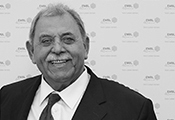Konrad Müller, former Head of Personnel and Administration, passed away on 28 March 2017 aged 76.
On 28 March 2017 EMBL lost one of its most prominent alumni with the passing away of Konrad Müller, former Head of Personnel and Administration, at the age of 76.
Konrad joined EMBL at the very beginning of the laboratory in 1975. For two decades he played a critical role, first in getting EMBL up and running and then in creating a culture that members of EMBL, both past and present, identify as the essence of being part of the EMBL family.
Konrad, perhaps more than anyone else we have ever known, liked to help people. Always content to put himself in the background, he took intense pleasure in the success of others. His interest in people encompassed everyone from cleaners and gardeners to leading politicians. He got along well with everyone and this incredible network was there to be tapped when problems arose. He was a true and unwavering product of the postwar era, a social democrat who wanted to make sure that society worked together for the greater good.
One of the reasons that Konrad was able to get so much accomplished was his time in German politics, before he arrived at EMBL. In the early days of his career Konrad worked for Herbert Wehner, one of the legendary figures of the German Social Democratic Party. However, his reach was such that he knew key figures in all political parties in Germany. As an intergovernmental organisation, having someone with these key connections was an enormous bonus for EMBL.
Konrad always knew whom to call to get the problem solved. For example, when an important reagent for research was held up in customs at Frankfurt Airport he had the telephone number of the key person in the relevant ministry in Hessen who could fix the problem straight away. And invariably, the person at the end of the telephone line appeared to enjoy speaking with Konrad. At the end of the conversation the problem was fixed and Konrad seemed as pleased as the person he was helping.
Other examples illustrate Konrad’s crucial role in the current make up of EMBL.
Food and social interactions were an important aspect of Konrad’s life, and he played a key role in supporting Claus Himburg establish EMBL’s canteen in Heidelberg as one of the finest restaurants in the world for a scientific institution.
When EMBL was being established in the 1970s, Konrad understood that a European institute had to encourage interchange across Europe. One initiative he led to support such networking was the creation of the EMBL guesthouses and links with the ISG Hotel in Heidelberg.
Konrad also set-up the first all day Kindergarten at EMBL, supporting staff arriving in Heidelberg with small children, and facilitating connections with the international school in Karlsruhe as well as other schools in the Heidelberg area, providing support for homework, language learning and integration.
Konrad played a crucial role in the establishment of Intermedex, a private health insurance system that was negotiated and designed specifically for the EMBL system, offering EMBL staff and pensioners worldwide insurance coverage.
He was also a driving force in establishing the EMBL Pensioners’ Association, and supporting the EMBL Alumni Association. In his capacity as Chair of the Pensioners Association and board member of the Alumni Association he initiated and funded the initial years of the John Kendrew Young Scientist Award in honour of EMBL’s first Director General John Kendrew.
Konrad left the EMBL in 1995 to ‘retire’. This gave him the freedom to take on new roles. During this time, he helped Klaus Tschira establish and nurture his Foundation, which supports key science and mathematics projects. He played a central role in helping alumni establish a new institute in Dresden – the Max-Planck Institute for Molecular Cell Biology, and also the driving force behind the European Life Science Organisation (ELSO), which organised almost 10 large congresses around Europe.
To the end Konrad never lost his affection for EMBL. He played a key intermediary role in obtaining generous Tschira Foundation funding for the establishment of the EMBL Advanced Training Centre (ATC), a centre of excellence for scientific events in Europe. His distinct red Land Rover could often be seen liberally parked near the EMBL workshops, and around Dresden, where he continued to visit, update and help his networks amongst the EMBL community. Konrad Muller was truly a larger than life figure the likes of whom we will not see again.
by Gareth Griffiths and Kai Simons
